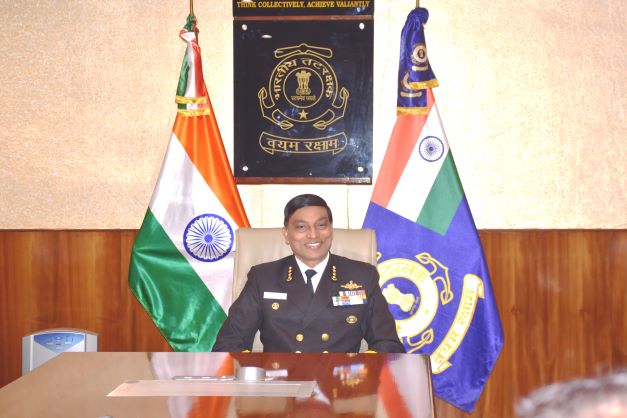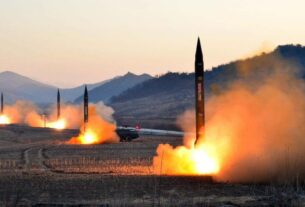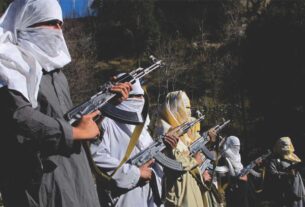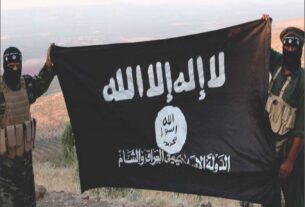DG Natarajan PTM,TM,Director General of Indian Coast Guard, in a candid interview with Ms Arti Bali from Strategic Affairs, spoke in detail about ICG’s vision, cooperation, challenges and future role
As you have completed over one year as the Director General of the Indian Coast Guard, Could you please enumerate the major accomplishments which were envisaged by you and the areas of major thrust?
It is indeed a privilege and honour for me to be at the helm of this fine professional Maritime service since 30 Jun 2019. Looking back at the year gone by, it has been a very satisfying as well as result oriented wherein we have achieved many a milestones. However, I would restrict myself to a select few.
- The preventive and measured response initiated by the ICG were by warning fishermen and Mariners in vernacular languages about impending adverse weather, ensured no loss of lives at sea, during the passage of more than 10 cyclones.
- ICG created yet another maritime history by averting a major ecological disaster in our immediate neighbourhood, by saving a massive 333m Very Large Crude Carrier (VLCC) MT New Diamond reported to be on fire off SriLanka Coast, without cargo-crude oil escaping into the sea. The ship was on passage from Kuwait to Paradip Port (India) with about 3 Lakh metric tons of crude oil.
- The Apprehension of contrabands worth about Rs.1600 Cr in addition to seizure weaponsin the year 2020 alone is a testimony of our hawk’s eye vigil on the vast EEZ which is more than three times the land mass of the Nation.
- Enhanced co-operation with all stakeholders to ensure safe secure and clean seas. We ensured close liaison with Ministry of Civil Aviation, Ministry of Shipping and Department of Fisheries to ‘harmonise Maritime and Aviation Search & Rescue mechanism’ to undertake mass casualty evacuation. Joint operations with other Law enforcement agencies to ensure secure seas around the Indian peninsula is providing great results.We also have been working closely with all Ministries and departments to promulgate new stringent National maritime laws.
- Concluded Phase-II of the Chain of Static Sensors project with M/s BEL, Bengaluru, will be operationalised in Nov 2021,and this would provide near gap free surveillance of the entire Indian coastline.
- Continuing our thrust on GoI vision of ‘Make in India’, ‘Aatma Nirbhar Bharat’ and ‘Digital India’. I feel proud to state that all our platform are indigenously produced / manufactured. Also,to give boost to ‘Digital India’ as well as to reach maximum candidates across the country and to speed up the recruitment process, we have implemented online examination process for our Enrolled Personnel.
What are the major challenges being encountered by the service in the present day scenario?
On the operational front, the biggest challenge is surveillance of our vast and vulnerable coastline, which extends over 7516 Kms. Post 26/11, there has been close coordination with various central and state agencies which has led to significant success. These include the promulgation of Standard Operating Procedures, Joint Coastal Security Exercises, formationof Coordination Committees at the state and district levels under the civilian administration and the establishment of Joint Operational Centre’s (JOC) at Mumbai, Visakhapatnam, Kochi and Port Blair under the overall supervision of the Indian Navy. However, at the same time working & coordinating with 14 different Ministries and other stakeholders itself poses plethora of challenges.
The length, topography and nature of the Indian coastline make coastal security an extremely challenging task. It demands a coordinated approach involving many central and state agencies. The Coast Guard and the Navy are continuously striving to achieve seamless cohesion and flow of information towards ensuring a robust Maritime Security Mechanism.
India’s long coastline presents a variety of security challenges including ingress of anti-national elements, use of the sea and off shore islands for criminal activities, and smuggling of consumer and intermediate goods through sea routes. The presence of vital industrial and defence installations near the coast increases the vulnerability of the coast to illegal cross-border activities. The threats and challenges being faced by various agencies need to be addressed in order to deploy an effective coastal security mechanism across the Indian coast. Smuggling of drugs and contraband, illegal unreported and unregulated fishing, and flow of migrants from neighbouring countries are variables that underscore the need for coastal protection.
What are your views on cooperation with the neighbouring maritime nations and are there any plans to foster International cooperation with them?
One of the most significant thrust areas for the ICG has been in the realm of Maritime Co-operation with littoral nations of Indian Ocean Region (IOR). We have taken several initiatives with the aim of establishing meaningful ties to share information, develop professional relationships to ensure safe and secure sea.
ICG ships have visited Thailand, Indonesia, Mauritius, Seychelles, Maldives, Philippines, Japan, Vietnam, UAE, Qatar, Bahrain, Oman, Singapore, Malaysia, Sri Lanka, Brunei, Bangladesh, Australia and Myanmar. These visits have helped in the ICG being recognised as a maritime force to reckon with Ships have carried out Joint exercises with their foreign counterparts during such visits,thus significantly enhancing interoperability between maritime forces. This is a critical aspect in tacking common threats at sea.
We have also signed 08 Memorandum of Understanding/ Cooperation with the maritime Law Enforcement Agencies of various countries, which include Pakistan, Oman, Sri Lanka, Bangladesh, Vietnam, Indonesia, South Korea, Japan. Additionally DOSTI Exercises for imparting training to Maldives National Defence Force (Coast Guard) and Sri Lankan Coast Guard are also being conducted periodically.
As part of newer initiatives, ICG is undertaking Maritime Law and Ops Course for officers and sailors from Friendly Foreign Countries in Africa, IOR and South East Asia at Coast Guard units in India. As part of initiatives towards enhancing maritime safety, our Maritime Rescue Coordination Centres have begun conducting Search & Rescue Communication exercises with their counterparts in 34 countries so that in any real emergency, the response action can be initiated without delay. With regards to Marine Pollution Response, we are planning to conduct specialised courses on Oil Spill Preparedness and Response SAR and Maritime law for partner agencies from 15 countries.
What are your views on strengthening ties with Japanese Coast Guard, US Coast Guard, Australian Coast Guard specially in terms of enhancing interoperability in communication, search and rescue procedures?
Indian Coast Guard has a very robust bilateral cooperation with the Japan Coast Guard since early 2000. This cooperation was formalised with the signing of Memorandum of Cooperation in 2006. The cooperation with the Australian Border Force commenced with the signing of Framework on Security Cooperation between India and Australia in 2014, which stipulates annual professional and operational exchanges between ICG and ABF. Since then, high level meetings, reciprocal ship visits and joint exercises have commenced and bilateral engagements are progressing in an upward trajectory. As to the cooperation with United States Coast Guard, I must make a mention that US Coast Guard has played a key role in the development and capability building of ICG. In fact, our Coast Guard is modeled on the lines of the US Coast Guard and our officers are undergoing professional courses with them over the years. As part of the developing Indo-Pacific strategy, USCG ships deployed in the South China Sea, visit India for professional engagements and joint exercise. I foresee enhanced engagements with both ABF and US Coast Guard in the future.
What is the status of acquisition of new surface and air assets for ICG?
We are in process of acquiring surface platforms and air assets to augment the force level in order to make its vigil to cover larger sea area. We have 156 surface platforms in our inventory with few are at various stages of production at Indian Shipyards. ICG has 62 aircraft and 16 Advanced Light Helicopters will join our fleet commencing Mar 2021. In addition, fourteen Twin Engine Heavy Helicopters (TEHH) and Six Multi-Mission Maritime Aircraft (MMMA) are at advanced stages of acquisition. The induction of these surface platforms and air assets will certainly give boost to the operational arm of our service.
In order to maintain an effective surveillance, what measure Indian Coast Guard has taken for capacity building?
To augment and modernize our force levels, the service has formulated a Coast Guard Long Term Perspective Plan (2017-2032) and Coast Guard Definitive Action Programme (2017-22). The key features of ongoing plan is to consolidate the gains made in the previous plans, besides gradual induction of ships and aircraft with proportionate development of infrastructure including augmentation of trained manpower. The service is likely to achieve a targeted force level of 200 surface platforms and 100 aircraft by the turn of the year 2025.
We are now, primarily focusing on consolidation of expansion achieved during the previous decade. We are also focusing on establishing a strong maintenance infrastructure to support the existing ICG fleet. In this endeavour, our future thrust area is to establish a modern ship repair yard and many such allied facilities to provide required impetus on serviceability of our surface assets for carrying ‘Concurrent & Continuous’ operations.
ICG is expanding its cooperation with littoral nations like Maldives and Mauritius. Can you throw some light on the recent developments?
India’s outer limits of EEZ and Search & Rescue Region are adjacent to Maldives and Mauritius. To provide aviation support to Maldives towards EEZ surveillance, one ICG ALH has been transferred to Maldives since Apr 2010. Also, to cooperate and enable Maldives National Defence Force to augment surface surveillance efforts of island nation, GoI has gifted one ICG Interceptor Boat (IB) to Maldives in Nov 19 post imparting operational & maintenance training to Maldivian crew.Besides, in accordance with directives of Ministry of Defence, joint EEZ surveillance of Maldives maritime zones is undertaken by ICG in conjunction with the Indian Navy since 2015.
In respect of Mauritius, the MRCCs of two countries regularly interact with each other for maritime Search & Rescue exercises and operations. We also provided Pollution Response assistance during National emergency declared by Mauritian Government in Aug 2020 due to grounding of bulk carrier MV Wakashio. The Ten Member ICG specialist team deputed to Mauritius for this operation. ICG has also handed over the 30 Tons of PR equipment to Mauritius Personnel post imparting detailed training on utilisation of PR equipment. ICG has positioned a Dornier with Indian Aircrew to under surveillance in Mauritius EEZ as per requirement projected by Mauritius Coast Guard. In addition, ships proceeding on OSD to Mauritius also undertakes regular surveillance in Mauritius EEZ.
What are your plans to build up and consolidate the ICG capability in performing SAR roles?
India has a Search and Rescue Region (ISRR) of approx 4 million SqKms. Indian Coast Guard has been assigned the responsibility for providing Search and Rescue in the ISRR. Coast Guard Maritime Rescue Coordination Centres (MRCCs) located at Mumbai, Chennai and Port Blair coordinate all cases pertaining to the Search and Rescue in the ISRR. These MRCCs are further assisted by the Coast Guard Maritime Rescue Coordination Sub Centres (MRSCs) co-located with the Coast Guard District HQs in each of the Coastal State of India.
Further, for effective SAR efforts, ICG is also in the process of developing common SAR support software for Maritime SAR along with other stakeholders. I am happy to state that our efforts have yielded desired results return and we were able to save about 10,000 lives in distress at sea, since inception which translates to saving one life every two days.
In order to extend ICG’s reach to the limits of the ISRR, we are consolidating the CG force level as per ICG perspective Plan. We are inducting Offshore Patrol Vessels (OPV) capable of carrying twin engine helicopters for extended SAR ops. We are also in the process of inducting the Twin Engine Heavy Helicopters (TEHH) to support our ships and augment our SAR efforts. These state-of-the-art aviation assets will have higher speeds and longer endurance which are vital for the successful culmination of SAR Ops.
What is the status of the ICG Academy and are there any plan to train officials from likeminded coast guards in the region?
GoI has accorded Approval-in-Principle to establish ICG Academy at Mangalore, Karnataka for which land has been acquired by ICG on 19 Sep 2020. In addition, a case for creation of 72 posts as project team for ICG Academy has been taken up with GoI. The proposed academy will have a capacity to train about 350 personnel and shall cater to meet the training requirement of our personnel in ICG specific charter of duties. The Academy shall also cater to impart training to the personnel from friendly foreign countries (Coast Guard /Maritime Agencies) under IMEC programme.
What is the status of modernization of the aviation branch of ICG and the acquisition of new choppers?
ICG has 62 Aircraft in the inventory and 16new generation Advance Light Helicopters MK III being manufactured by M/s HAL will join our fleet in a staged manner starting Mar 2021. In addition, we are progressing cases for Twin Engine Heavy Helicopters (TEHH) and long range Multi-Mission Maritime Aircraft (MMMA) to enhance our interdiction, SAR and surveillance capability. We are also undertaking Mid-Life upgrade of Seventeen Dornier Aircraft through M/s HAL (TAD), Kanpur to enhancing capabilities of the present fleet of aircraft. We are also in the process of modernising our Airfield Infrastructure at all the dedicated Coast Guard Air Stations for all weather operations.
Which are the countries the ICG is looking forward in signing MoU to have mutual cooperation and collaboration in future?
We are very close towards signing of Memorandum of Understanding with the Philippines Coast Guard. We are also keen to formalize cooperation with Coast Guards and maritime agencies of Singapore and Malaysia in South East Asia and Qatar and UAE in the Middle East. We have also agreed to progress and sign standard operating procedures with maritime agencies of Myanmar in the domains of Maritime Search & Rescue and Marine Pollution Response.
Since you are expanding international cooperation, do you think you will deal more closely in future with ministry of external affairs?
The ICG deals with 14 Ministries in accomplishing over national objective. By the Very national of our charters there is a need for close interaction with MEA. Our International Cooperation division has been working with various divisions of MEA. Earlier, our bilateral cooperation was limited to countries in the immediate neighborhood. However, as you rightly pointed out, now we are engaging with MEA divisions dealing with countries ranging from East Africa, Indian Ocean region, Middle East, South Asia, South East Asia and East Asia including Australia. We have also commenced training of officers and sailors from friendly foreign countries under the ITEC programme of MEA. Further with the growing focus on the Indo-Pacific region, our engagements with newly constituted Indo-Pacific division are also definitely going to enhance.
Any message for the Maritime Community from the Director General, Indian Coast Guard?
The Indian Coast Guard, being the largest in the Region, plays a stellar role in protecting the wide-ranging peacetime Maritime interests of our Nation. Following “on the beat” philosophy to protect vast Coastline from ANEs and keep our oceans safe & secure, we continue to maintain 24x7x365 vigil at sea, despite various limitations and challenges presented by ongoing COVID pandemic. Mere presence of Indian Coast Guard unit at sea serves dual objectives of “Deterrence” and “Reassurance”. Our presence deters people with ill-intent and at the same time reassures maritime community, who look up to us as “Saviours at sea”, as they are aware that Indian Coast Guard will swiftly respond to any distress call or life-threatening situation at sea. ICG remains committed to ensure ‘Safe, secure and clean seas’ around the Indian subcontinent for Mariners and live up to our Motto ‘We Protect’.




